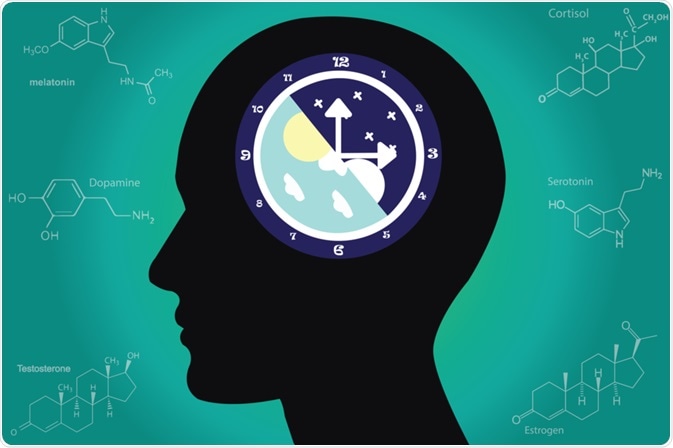Circadian rhythm sleep disorders are a type of sleep disorder that involves abnormalities in the timing of sleep.

Image Credit: kanyanat wongsa / Shutterstock.com
What is the circadian rhythm?
The circadian rhythm, also sometimes referred to as the body clock, is the natural pattern of sleep in the body, including feelings of sleepiness and wakefulness during the day. It naturally affects the body temperature, appetite, hormone secretion, and alertness of the individual, which influence the timing of sleep.
A patient affected by a circadian rhythm sleep disorder is unable to sleep and wakes up at the times according to their circadian rhythm, due to work, study, or lifestyle commitments. In most cases, they are able to get enough sleep throughout the day if they are able to sleep according to the cues of their body clock; however, their daily commitments are out of sync with their circadian rhythm, which increases the difficulty in falling asleep when they have time to sleep.
Delayed sleep phase disorder
Delayed sleep phase disorder refers to when the body clock of an individual is two or more hours later than what is considered normal, resulting in delayed feelings of sleepiness and wakefulness with respect to the external environment.
This typically means that affected individuals fall asleep after 1 a.m. in the night and do not naturally wake until the late morning or afternoon. However, most people with this disorder have work or study commitments in the morning that shorten the duration of the sleep, which may lead to sleep deprivation and daytime sleepiness.
Light therapy and melatonin treatment may be useful in helping to advance the sleep phase by up to two hours; however, these options may not be possible for all individuals to advance their sleep phase to the normal schedule.
Advanced sleep phase disorder
Advanced sleep phase disorder refers to when the body clock of an individual is two or more hours earlier than what is considered normal, causing them to feel sleepy in the early evening and to awaken earlier in the morning or in the night.
This type of circadian rhythm sleep disorder appears to be less common than delayed phase, although this may be because most individuals with the disorder do not experience any negative symptoms if they are able to arrange their activities to allow for sleep at an earlier time.
Free-running type
Free-running sleep disorder, also known as non-24 sleep disorder, occurs when an individual experiences sleepiness and goes to sleep later each consecutive day, as their circadian rhythm is longer than 24 hours.
This leads to a disrupted sleep cycle that is not aligned with natural changes in light, such that for some periods, the affected individuals will sleep normally at nighttime, whereas in others they will only be able to fall asleep during the day. This disorder can be very distressing, as it inhibits affected individuals from maintaining normal daily activities, such as work, study, relationships, and other commitments. For this reason, it is linked to isolation, poverty, and depression.
Irregular sleep-wake disorder
Irregular sleep-wake disorder involves more frequent episodes of sleep than normal, usually at least three in each 24-hour period that occur at different times each day. This type of sleep disorder is most common in elderly individuals who suffer from dementia, but can also commonly be identified in children with developmental disorders.
Shift work sleep disorder
Shift work sleep disorder is an extrinsic circadian rhythm disorder, which means that is it caused by external circumstances. People who work on shift rotations during the night and day are more likely to suffer from changes to the body clock due to altered sleeping patterns, although some individuals are more susceptible than others.
This sleep disorder can lead to difficulty falling asleep when there is time to sleep and chronic sleep deprivation, including symptoms of daytime sleepiness and decreased performance.
Jet lag sleep disorder
Jet lag sleep disorder occurs when an individual travels quickly across several time zones without allowing their body clock to adjust to the external environment and light cues. This requires a shift in the sleep-wake cycle and the circadian rhythm, which can take time and cause symptoms of sleepiness in the meantime. However, the body usually adjusts to the new time zone within a few days of traveling.
Treatment
The treatment of circadian rhythm sleep disorders usually involves techniques to adjust the internal body clock and sleep-wake cycles so that they are closer to normal. This may include:
- Behavior therapy – It is recommended that affected individuals avoid naps, caffeine, and alcohol before bedtime.
- Bright light therapy – This treatment option can be used to advance or delay sleep cycle.
- Dark therapy – Dark therapy can be used to block light stimuli during the night.
- Pharmacotherapy – Pharmacologic agents such as melatonin or modafinil can be used to aid sleep.
References
Further Reading
Last Updated: Mar 15, 2023